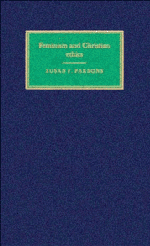Book contents
- Frontmatter
- Contents
- General editor's preface
- Preface
- 1 On diversity
- 2 The liberal paradigm
- 3 Critique of liberalism
- 4 The social constructionist paradigm
- 5 Critique of social constructionism
- 6 The naturalist paradigm
- 7 Critique of naturalism
- Transition: Picking up some threads
- 8 Towards an appropriate universalism
- 9 Towards a redemptive community
- 10 Towards a new humanism
- Notes
- Select bibliography
- Index
- NEW STUDIES IN CHRISTIAN ETHICS
6 - The naturalist paradigm
Published online by Cambridge University Press: 20 January 2010
- Frontmatter
- Contents
- General editor's preface
- Preface
- 1 On diversity
- 2 The liberal paradigm
- 3 Critique of liberalism
- 4 The social constructionist paradigm
- 5 Critique of social constructionism
- 6 The naturalist paradigm
- 7 Critique of naturalism
- Transition: Picking up some threads
- 8 Towards an appropriate universalism
- 9 Towards a redemptive community
- 10 Towards a new humanism
- Notes
- Select bibliography
- Index
- NEW STUDIES IN CHRISTIAN ETHICS
Summary
But men do not look at both sides, and women must leave off asking them and being influenced by them, but retire within themselves, and explore the groundwork of being till they find their particular secret. Then when they come forth again, renovated and baptized, they will know how to turn all dross to gold, and will be rich and free though they live in a hut, tranquil, if in a crowd. Then their sweet singing shall not be from passionate impulse, but the lyrical overflow of a divine rapture, and a new music shall be elucidated from this many-chorded world.
In 1843, these words of Margaret Fuller, published in an American transcendental literary quarterly, expressed something of a vision for the lives of women which is central to the appropriation of the naturalist paradigm within feminism. Recognising a situation of unequal privilege between women and men, she argues that what women most want is ‘for that which is the birthright of every being capable to receive it – the freedom, the religious, the intelligent freedom of the universe, to use its means, to learn its secret as far as nature has enabled them, with God alone for their guide and their judge’.
- Type
- Chapter
- Information
- Feminism and Christian Ethics , pp. 121 - 147Publisher: Cambridge University PressPrint publication year: 1996



